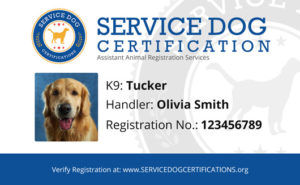Home Page › Blog › Florida Service Dog Requirements
Florida Service Dog Requirements

The Sunshine State allows service dogs to travel, reside with, and perform daily living activities with their owners. The State of Florida aligns with the federal American Disabilities Act (ADA), which provides service dog owners the rights and privacy with their service dogs. These rights cannot be denied, regardless of the local jurisdiction laws or private business ownership rules. Anyone who uses a service dog for their disability in Florida is protected by these laws and are entitled to the use of their animal.
What is a Service Dog?
The ADA definition of a service dog is similar to the Florida Statute 413.08 definition. Florida Statute 413.08 defines a service animal as one that is “trained to do work or perform tasks for an individual with a disability… A service animal is not a pet.” These tasks are vital for the quality of life of the person with the disability. For instance, a service dog may help obtain a life-saving medication, guide the visually impaired, or help with mobility issues.
How are Service Dogs Trained?
Service dogs must be trained to perform a task that the person with a disability would otherwise be unable to perform themselves. Their training must be specific to the needs of the person with the disability. Service dogs can be trained through a professional canine trainer or by the dog owner themselves.
If a trainer is training the service dog, Florida law allows them the full rights provided to a service dog owner during training sessions. They are allowed into public facilities and transport, just like service dog owners are. This will enable trainers the full ability to train a service dog well.
Identification and Registration Requirements for the State of Florida
According to Florida Statute 413.08, documentation that a service animal is trained is not required. Although not mandatory, registration is recommended as it allows easier access to all public accommodations. Having identification and registration available, though not necessary, mitigates any unexpected problems or harassment.
To protect the service dog owner’s privacy, the public can not inquire about the nature of the service animal’s owner’s disability. They may only ask two questions:
- Is this a service animal?
- What task has the animal been trained to perform?
Neither business nor private entities may ask personal questions such as:
- Asking the owner to have the animals perform their assigned task as a demonstration.
- Asking the service dog owner declare their illness or disability.
- Demanding documentation regarding registration or training.
Leash Requirements for Service Dogs
Florida laws require that a service animal must be under the control of its owner at all times. The service animal must be properly outfitted with supplies such as a leash, harness, or tether. If a leash, harness, or tether interferes with the tasks the dog must perform, then the dog must be under the owner’s control at all times through the owner’s voice or signal commands.
Service Dog Behavior Requirements
Although a service dog is essential to their owner’s well-being, both ADA and Florida laws are explicit about their expectations for public safety. These include the following points:
- Service dogs must be under the control of the owner at all times.
- Service dogs can be removed or excluded from an area if the dog is out of control, is not appropriately housebroken, or is a safety issue for the public.
- Fear of animals or allergies is not a justifiable reason for the exclusion of a service animal.
- If a service animal must be removed for being a threat, the service dog owner must be provided the option of remaining without the service animal.
- Damage caused by the service animal is the responsibility of the service animal’s owner.
Any person who interferes with these rights may be subject to a misdemeanor of a second-degree in the state of Florida.

Misrepresentation of a Service Dog
The state of Florida considers the misrepresentation of a service dog a second-degree misdemeanor. If a person knowingly presents themselves, in writing, verbally, or through their actions, as having a service dog and do not qualify as such, they may be subject to prosecution.
Public Accommodation for Owners of Service Animals
“Public accommodation” is a broad term and, in short, means that people with service animals are allowed anywhere the general public is also invited. For instance, hotels, public transportation, and resorts are examples of areas where service animals are allowed.
Safety of Service Animals in Florida
The service dog laws for the state of Florida are very similar to the federal regulations. Florida also goes the extra mile to protect its service animals, with laws against any interference or injury. These laws prohibit the obstruction, harm, or intimidation of a service animal by another person or an animal owned by that person. These actions are punishable as a misdemeanor in the first-degree or a felony of the third-degree, depending on the severity of the incident.
Know Your Service Dog Rights and Requirements in Florida
Being knowledgeable about the rights and requirements of service animals in your state helps keep you and the service animals safe. Respecting the laws, providing the service animals the safe space to do their job, and establishing the correct qualifications can keep the integrity of service dogs intact.
About the Author: The writing team at Service Dog Certifications is made up of folks who really know their stuff when it comes to disability laws and assistance animals. Many of our writers and editors have service dogs themselves and share insights from their own experiences. All of us have a passion for disability rights and animals.
Latest Posts

How to Bring a Service Dog to Disneyland
Trained service dogs are more than welcome to join their handlers at Disneyland. In this guide, we’ll explain Disneyland’s policies and give practical advice for bringing a service dog to Disneyland for the first time. Disneyland’s Service Dog Policies The Magic Kingdom is happy to welcome trained service dogs across most park locations! They kindly […]

Read More

Can Dogs Eat Tomatoes?
Yes! Dogs can safely enjoy tomatoes, but there are a few risks to be aware of so you can feed your dog responsibly. Fully ripe tomatoes (without the stems and leaves) can actually have nutrients that are good for your pup. Tomatoes have chlorogenic acid, an antioxidant that can have anti-inflammatory effects in cells. They’re […]

Read More

Can a Primary Care Doctor Write an ESA Letter?
Your family doctor, also called a primary care physician (PCP), can write a letter recommending an emotional support animal. We’ll explain what legally gives them that ability and explore what better options might be available for you. Why are Physicians Able to Write an ESA Letter? To turn your pet into an emotional support animal, […]

Read More









What qualifies the dog as a service dog?
We think you will find this article helpful: https://www.servicedogcertifications.org/service-dog-requirements/
A service animal is by definition of the American Disability Act is an animal which helps a person overcome their disability. The disabilities are blindness, the guide dogs, deafness , animals trained to respond to phone doorbell or someone calling the persons name, seizures, animals trained to prevent someone from harming a person during a seizure, or mobility animals that pull a cart to move a disabled person around. A emotional support animal is not classified as a service animal. There are drugs and treatment for goose who suffer from PTSD and those animals are not covered by the ADA.
That is correct regarding ESAs – they are not in the same category legally as service dogs. However, the number of disabilities that qualify for service dogs is much greater than the ones you listed! Psychiatric service dogs for example help people with mental health issues: https://www.servicedogcertifications.org/psychiatric-service-dog/